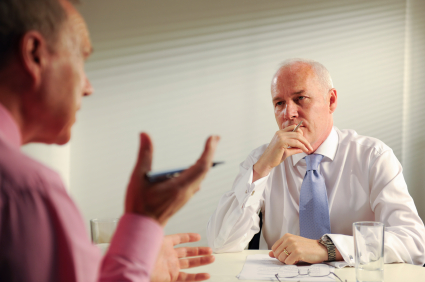Communications and Sales: How to Change a Bad Sales Habit
When we listed the 16 bad sales habits customers want your sales people to stop, it revealed some fairly common mistakes in communications. You can probably identify your company’s sales people who continually engage in each of them. You might use a few of these bad sales habits yourself.
The book What Got You Here Won’t Get You There… in Sales, by Goldsmith, Don Brown and Bill Hawkins do a great job of explaining each habit and the consequences. These bad habits fall under two conceptual umbrellas:
- Information
- Emotions
Go back and review the list of bad sales habits and you’ll find that any one of them is either a case of serious overload or underload of information or emotion. Information and emotions themselves are neither good nor bad, they’re neutral components.
The critical need is in applying the appropriate amount of information or emotion in order to achieve rapport and empathy. This is what builds quality relationships with people.
Bad Sales Habit: Too Little or Too Much Information/Emotion?
Information: the destructive habit of selling past the close is a case of giving way too much information. Also included in this category of bad selling habits are vocal fillers, one-upping, and explaining failure.
On the flip side, when we aren’t gathering enough information, we’re committing curb qualifying, selective hearing, and propagandizing.
Emotion: In this category of bad selling habits, we create an emotional mismatch when we withhold energy and passion, don’t say we’re sorry, use tension as a tool, and become over-familiar.
When you invest too little emotion, you come across as disinterested, disconnected, and uncaring. No one wants to do business with a dry fish. When you inject too much enthusiasm, however, you create tension which customers want to avoid. Either way, the emotions are not conducive to creating real rapport.
How to Stop a Bad Habit
What can you do with the habits you identify, the ones you know you do almost without being aware? Most people intuitively know where they trip up. Pick one to work on, only one at a time.
You can’t change your behavior all of a sudden and expect it to last. The best ways to improve any habit is to follow proven behavioral change strategies:
- Gather data: you can’t know what to change without your own and outside observations
- Make notes of the statements you habitually make that lead you in the wrong direction
- Create a mental mute button: learn to hold your tongue
- Share your plan with a trusted peer, mentor or coach and report back on your progress
This last point, which requires involving others in your self-improvement plan, is what really works for behavior changes that last. But it’s also the most courageous to undertake. If you’re interested in how to improve your lead generation and sales, let’s talk! You can contact me here.








